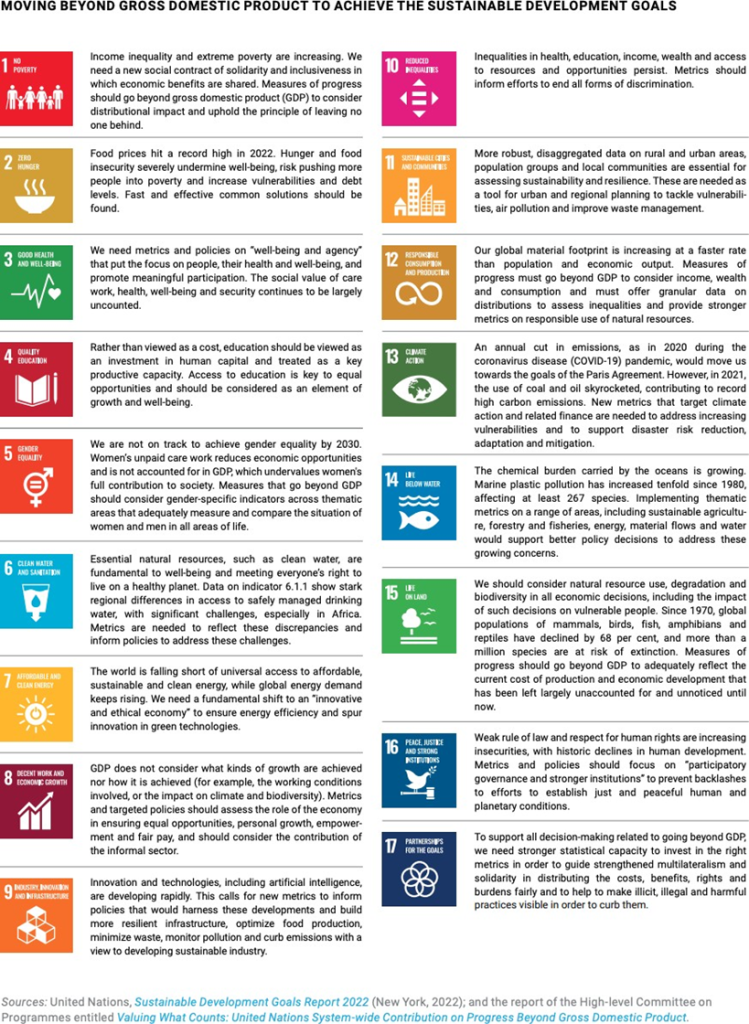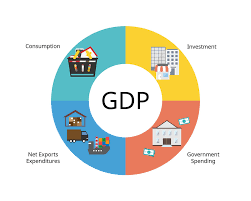Framework to Progress Beyond Gross Domestic Product
EXECUTIVE SUMMARY:
The current reliance on Gross Domestic Product (GDP) as a primary measure of development and/or metric for resource allocation has several shortcomings. It fails to account for certain dimensions of economic activity, environmental destruction and human well-being. There have been several initiatives by governments, organisations and civil society actors to “Go Beyond GDP”; these include, most prominently, the Sustainable Development Goals (SDGs), the 2030 Agenda for Sustainable Development and the Human Development Index, among others.
The foundation of this proposal lies in target 17.19 of the SDGs, which calls upon Member States to build on existing initiatives to develop metrics that complement GDP in measuring sustainable development and support statistical capacity-building in developing countries by 2030. The key recommendations of the proposal are as follows: a renewed political commitment to accurately “value what counts”, the formation of a robust technical and scientific process to produce key indicators that go “Beyond GDP” and a major capacity- building and resourcing initiative to enable member states to effectively utilise the new framework. Overall, these recommendations pave the way to create a universal and comprehensive measurement of sustainable development to complement, rather than replace, GDP; to more strongly capture what matters to the people, the planet and the future.
Current Deficiencies – As mentioned in paragraphs 38 and 39 of my (Secretary-General’s) report entitled “Our Common Agenda” (A/75/982), GDP does not account for human well-being, environmental sustainability, unpaid household services, such as care work, and the biased distributional dimensions of economic activity. Moreover, it fails to capture the human and environmental destruction of some economic activities. Harmful practices, such as deforestation, overfishing and the burning of fossil fuels, often contribute to increases in GDP. As a result of serious compilation and measurement challenges, GDP still often insufficiently captures new economic phenomena, for example, digitalization and the use of free digital services, the use of crypto assets and the development of data.
By using GDP or income as a proxy for development, we fail to recognize that sustainable development is multidimensional and affected by multiple factors, such as access to resources, productivity traps, social and environmental dependencies, inequalities, vulnerabilities, challenges related to institutional capacity, and the significant vulnerabilities that may exist in countries with high levels of GDP. Similar levels of national GDP can obscure the very different development realities, vulnerabilities and challenges that exist in different countries.
Despite these evident shortcomings, GDP continues to be used – or misused – as the benchmark for important national and international policy settings, in particular in respect of development financing. This notably includes criteria of eligibility for official development assistance and decisions on debt relief and concessional financing, as well as such matters as graduation from the status of least developed country. This excessive dependence on GDP has created damaging bottlenecks and grave inequities in the functioning of the international financial architecture, with serious consequences for the sustainable development of all countries, in particular middle-income countries and small island developing States.
Recent initiatives to go ‘Beyond GDP’ – Indeed, the Goals and their indicators are the most comprehensive
“Beyond GDP” framework agreed to and measured today.
Other initiatives include:
- The 2030 Agenda for Sustainable Development and the Sustainable Development Goals
- The United Nations Development Programme Human Development Index
- Gender-specific indicators across thematic areas that go beyond the Goals and adequately measure and compare the situation of women and men in all areas of life
- Work focused on inclusive growth and efforts to go beyond GDP undertaken by the Organisation for Economic Cooperation and Development, the European Commission, the World Bank and the International Monetary Fund
- Measures of environmental degradation and depletion, environmental and economic accounting and measures of inclusive or comprehensive wealth by the United Nations Environment Programme and the World Bank.
PROPOSAL: In target 17.19 of the Goals, Member States are specifically called upon to build on existing initiatives to develop measurements of progress on sustainable development that complement GDP and support statistical capacity-building in developing countries by 2030. This call was taken up in Our Common Agenda and in the report of the High-level Committee on Programmes entitled “Valuing What Counts: United Nations System-wide Contribution on Progress Beyond Gross Domestic Product”, which serves as the technical foundation for the present policy brief.
There are a number of opportunities ahead of us to identify and develop “Beyond GDP” metrics. The System of National Accounts, in which GDP is embedded … is being revised again, with a view to completion by 2025. The effort to go beyond GDP should capitalize on the opportunity of this update to the System of National Accounts, which will be focused on the measurement of digitalization and globalization, in order to better account for well- being and sustainability. This brief also seeks to build on the implementation of the System of Environmental- Economic Accounting and the System of Environmental-Economic Accounting – Ecosystem Accounting.
RECOMMENDATIONS:
Action to go beyond GDP must be driven by a clear and shared political commitment and underpinned by strengthened technical capacity and expertise. It must be concise, widely accepted, comparable and applicable to decision-making.
- A renewed political commitment to create a conceptual framework that can accurately “value what counts” for people, the planet and the future, anchored in the 2030 Agenda, and the commitment set out therein to leave no one behind, by the time that the Summit of the Future is held in 2024. The framework should be designed to achieve three main outcomes:
- Well-being and agency;
- Respect for life and the planet;
- Reduced inequalities and greater solidarity.
The framework should also be based on three additional elements to pave the way for transformation:
- Participatory governance and stronger institutions – Steering us towards equitable, inclusive and safe societal conditions in which everyone is empowered to participate and contribute and from which everyone can benefit safely and effectively (the social dimension);
- Innovative and ethical economies – Serving people and the planet through innovative approaches as a way to find collective solutions to our challenges, involving responsible and ethical actions to deliver positive outcomes that uphold people’s rights (the economic dimension);
- From vulnerability to resilience – Focusing on our interaction with the natural and built environment to strengthen preparedness and ensure well-being in a context of multiple risks and uncertainties (the environmental dimension).
- The elaboration of a robust technical and scientific process, informed by sound and disaggregated data, resulting in a United Nations value dashboard of a limited number of key indicators that go beyond GDP.
I propose the selection of a set of core metrics that would be assessed, developed and selected through a scientific, multidisciplinary process and that would need to be:
- Comparable across time and countries, well-established and trusted
- Country owned
- Universally applicable
- Able to convey strong and clear messages that are actionable and intuitive
- Scientifically robust and statistically sound
- Iterative and dynamic, based on what exists, while allowing for the addition of new indicators, as relevant
The methodology and process to develop these indicators should build on current capacities and ongoing work and incorporate appropriately the results of the High-level Panel on the Development of a Multidimensional Vulnerability Index, as well as existing indices and indicators, including the Sustainable Development Goal indicators, the human development index and other relevant indicators that account for human rights and gender equality.
I (Secretary-General) propose the establishment of a high-level expert group of independent experts with a mandate to produce by March 2024 an initial value dashboard of a limited number of key indicators (ideally not more than 10–20 indicators) that go beyond GDP. This should be presented for consideration by Member States in preparation for the Summit of the Future. The technical work of selecting and verifying data indicators should be undertaken through the Statistical Commission, which also hosts the global indicator framework for the Sustainable Development Goals and targets of the 2030 Agenda, to ensure the robust and scientific accuracy of the metrics.
- A major capacity-building and resourcing initiative to enable Member States to use the new framework effectively.
The United Nations system must help statistical offices to shift priorities towards new metrics, including a more comprehensive accounting of stocks and flows, distributions, sustainability and intergenerational perspectives, vulnerabilities and aspects related to innovation, governance, stability, participation and human rights. In addition to a dashboard, Member States will need to be empowered to have comprehensive data sets that allow for disaggregation. As metrics will need to be developed to reflect elements beyond today’s needs, they cannot be limited by the data we have today. New capacity development efforts should involve innovative approaches and ensure that the use of new technologies is accessible to all countries.
With the provision of adequate capacity-building, the dashboard will eventually form a high-quality, widely available and comparable body of information based on global and national official statistics and new sources
and technologies.


